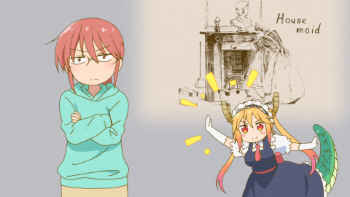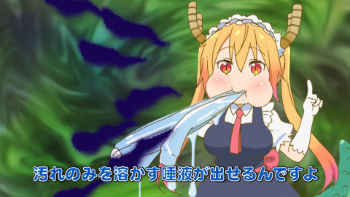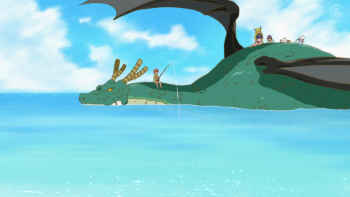

 |
 |
||||
| Home | Reviews | Extras | Forums |
|
Miss Kobayashi's Dragon MaidSynopsisWaking up and getting ready for work after a drunken bender the day before, Kobayashi finds herself face to face with a gigantic dragon standing right outside her apartment. She's even more surprised when the dragon, whose name is Tohru, changes into a human and wants to become her maid. ReviewI said in my review for Interviews with Monster Girls that said monster girls seems to be a new fad, but also that it might be a bit unfair to say or think so. But it's hard to not do so when said show is aired more or less in tandem with Miss Kobayashi's Dragon Maid, especially seeing as both of them are really good. Whether it's fetishy or not, I'm always fond of shows that include nonhuman characters, especially in a positive light. (Or at least just as on-average neutral as human beings.)   Granted, in Interviews with Monster Girls, the titular monster girls were still technically human, but their differences were still what drove the main plot. That, and how to make them a part of regular life. Compare to that, Tohru is a full-fledged dragon, but also technically not an Earthling since she comes from an alternate world. At first, she's almost stereotypically fantasy draconic too, wanting to solve every problem by destruction and armageddon and referring to humans as "lowly" or "inferior". Yet, despite part of Miss Kobayashi's Dragon Maid's plot being about her integrating with human society, that's one of the parts she handled the easiest. (Much to Kobayashi's chagrin, who had to face the fact that Tohru was much better at socializing than she was, and after such a short time in the human world too.) There are still some bad habits Kobayashi has to break Tohru out of, like not doing laundry with her mouth or not serving her tail for dinner, though the latter leads to at least one funny gag of Kobayashi acting like a picky child eater. And it's still funny to see any of the dragon girls understanding how things work in the human world, but still being confused as to why. Yet Tohru actually does a pretty good job in acclimating to her surroundings. In fact, she seems to have an easier time of it than Kobayashi herself. Before Tohru entered her life, she had about the same life as a certain Daikichi Kawachi from Usagi Drop: work, work, work and then drinks at evenings. Her meeting with Tohru had taken place during one of her drunken benders, where she had rather carelessly offered Tohru a place to stay. If you go by first impressions, Kobayashi might be seen on as a responsible type, but she doesn't really have much of a life outside of work and her massive maid fetish, made worse if she is drunk once the topic enters the equation. Tohru's pushiness gives her a nice connection to Kobayashi's antisocial behavior, and the fact that Tohru is an alien dragon girl, more or less, makes her different enough that Kobayashi doesn't need to lean on any usual human rules of interaction. In her own way, Tohru makes Kobayashi feel a lot more normal, while Kobayashi's openness to oddities allows Tohru to fit in without having to change the core of herself. Naturally, Tohru isn't the only dragon who'll show up on Kobayashi's household. She is quickly followed by Kanna, a dragon child who is banished from her home for doing pranks, and ends up playing the "child" role in the Kobayashi's household. (Well... apartmenthold.) I was a little worried that she'd end up being a pseudo-antagonistic foil to Kobayashi, but once all the misunderstandings are cleared up, she becomes easily the most adorable addition to the show. (And her dragon form is really pretty too.) The reason she's so adorable is that Miss Kobayashi's Dragon Maid does such a good job at portraying her as a child, yet not putting aside the fact that she's also a dragon. After a request to go out and play, they end up going to a field and literally tearing the ground up. And describing it as just a little bit of roughhousing. Yet, you haven't seen adorable until you've seen Kanna track down Tohru for a little bit of lap pillow. And you haven't seen harshing that feeling until you've seen her look upon the majesty of a pretty butterfly... right before eating it. And it isn't the last time she'll do that either, later even making it into a homework paper for school. Brings to mind a certain Far Side strip with a guy, his typewriter, a list starting with "Things I have eaten that starts with the letter M" and a certain insect buzzing around the lamp hanging from the ceiling. 
Still... super adorable. The third dragon who comes along is Quetzalcoatl, mostly known as Lucoa. And if Tohru describes herself as "size D for Dragon", then Lucoa is definitely a size L (if you catch my drift like she caught Kobayashi's consternation and possible envy.) Lucoa is easily the calmest of the dragons, and the one most likely to offer good advice that doesn't involve killing or armageddon, though on the other hand, her contributions to comedy usually revolve around her chest size and the nightmares it gives a boy she later takes care of, as well as her general taste in clothes. (Kobayashi describes it as "dressing like a prostitute", which is a bit uncalled for.) My biggest concern about this show was that it would take that comedy a step too far, but that thankfully never happened, Lucoa's fervent attempts notwithstanding. Still, the show does tend to limit her to gags and the likes that revolve solely around her chest or the tacky clothes she wears, and while that's fine as a side dish, I really do wish they'd play up her "big sister" part a bit more, because you can only do so much with breast jokes. She mostly has her eyes closed too, which might have something to do with how looking into them for too long might break your brain from trying to figure out what kind of secrets they hold. Not that the show has a ton of fanservice, but what little it has tends to be a lot more provocative than you'd normally see. Lucoa's lack of understanding humans tend to make her catering to Shoutaro, her little ward, come across as vaguely sexually harrass-y, while there is also a scene where Kanna plays Twister with her newest friend Riko that also comes across as mildly iffy. The show thankfully never gets truly offputting with its comedy, so I was able to just let it slide. It seems oddly self-conscious about itself too, with the show flaunting its two female draconic leads in the token swimsuit episode, which is an impressive sight by itself. The show did garner some positive attention through Tohru being a bit more heavy-set than your average female lead in fanservice shows, which is a statement I can at least partially agree with. That said, Miss Kobayashi's Dragon Maid's art style is a bit more cartoonishly styled than said shows, with most of the cast having rounder faces that are longer in width than in height. Still, both Tohru and Lucoa have a bit more stockier build that makes it easier to believe that they could carry around chests like that without getting serious back problems. It's a bit like the observation I made in my review for Super Sonic: The Animation.  Of the main cast of dragons, Fafnir remains the sole male example throughout the majority of the show. For those who take words at face value, he's definitely the one who makes the worst of first impressions, because everything he talks about tends to revolve around killing, death and curses. Not helping is that he's rather dark and gloomy and seems rather detatched towards everything. But he quickly forms a bond with Kobayashi's male coworker and fellow maid otaku and later moves in with him. Last on the roster is Elma. Where Tohru belongs to the chaos faction of her home world, Elma is a part of the faction of order, so technically, they are enemies. Yet Elma is here to bring Tohru back because she... likes their rivalry, I suppose? She's a bit harder to place because she basically arrives near the end of the season, so her only contribution is a lot of low income/food temptation jokes. She does get a job alongside Kobayashi, and seems like the responsible type altogether, but so far, she doesn't amount to a whole lot in this show. For her sake, I can only hope a second season will be greenlighted.    Arriving a bit earlier as support characters go is Riko Saikawa. Like Fafnir, she didn't make the best of first impressions, and even the other students at shool kind of thinks badly of her. But with a small addition of fake tears from Kanna, they become fast friends, and honestly, I don't even know why she's considered to be so bad. Sure, she's a bit of a loudmouth, but I hardly have the right to get up on a high horse over that. If she reminds me of another character of her kind, then maybe Greta from A Little Snow Fairy Sugar, in that she can come across as somewhat abrasive and competitive, but is otherwise a relatively nice person underneath their tsundere front. It's especially notable once Kanna got under her skin too, where at first her angry expression is replaced with a more lonely-looking one. Miss Kobayashi's Dragon Maid is mainly a comedy, and it does very well here. Granted, the aforementioned limitation of Lucoa to fanservice/breast jokes isn't particularly creative by itself, but the core of the show is basically about a bunch of dragons trying to fit into human society, and all the sardonic comments coming from both sides of the interdimensional borders is what gives it its deliciously spicy taste. The fact that Kyoto Animation is also very adept at physical comedy (and a very good animation house altogether) certainly does this show a lot of good. Yet despite its general lighthearted tone, Miss Kobayashi's Dragon Maid can get rather heavy at times. The main theme of the show obviously has to do with family, with Kobayashi, Tohru and Kanna making for an endearing family unit. It's especially apparent seeing as Tohru's placed herself in a self-imposed exile, while Kanna followed Tohru to Earth and now can't get back on her own, though she doesn't have parents that would welcome her anyway, even if she could. The two of them do the same thing Fafnir and Lucoa eventually do; seek bonds with other people, regardless of which kind. Tohru introduces herself to Kobayashi by telling her she's interested in Kobayashi sexually, but does she even know what that means? She does have parents herself, but dragons might have a completely different sense of what's sexual or not, especially given how she interpreted a certain creepily obnoxious shoujo trope as "humans communicating through sounds", a gag by itself being a marvelous deteething of said trope. Then again, Tohru is sending Kobayashi some pretty clear come-ons so... maybe the differences between us and them aren't as big as you'd think.    Miss Kobayashi's Dragon Maid also makes no secret of the fact that dragons live longer than humans by an almost absurd ratio, so Tohru's wish to bond with Kobayashi comes with the inevitability that she'll have to watch her grow old and die. Beyond that, it's also clear that Kobayashi and her fellow humans are rather fragile compared to even the humans back in Tohru's home world, so a dragon who wants to live on Earth is going to lead a rather... restricted life. Though letting loose every now and then is probably quite beneficial to the dragons, not to mention a lot of fun for the audience. More that that, Tohru often asks herself how exactly the two of them could live together so easily, especially since the relationship between humans and dragons back in her own world is not very good. That's not really anything new on its own, but you don't always see it so neutrally defined, all the benefits and flaws combined. There is a twinge of the kind of feeling you'd get from watching an episode of Natsume's Book of Friends at its most introspective and emotional whenever Tohru gets a sad look in her eyes. I wasn't quite sure what to feel when the show chose to do a Christmas episode by having the girls do a rendition of The Matchstick Girl (Piken med svovelstikkene), and then proceeding to alter the original story by inserting Japanese culture, both new and old, into the equation. To the point where there was nothing left resembling the original tale. It's an interesting choice of tale because whether you think of it as a really depressing story or a really happy one depends on how on board you are with christianity and the concept of heaven as an end to suffering. The whole thing ended up resembling a magical girl show more than anything else anyway, and while I found that concept... iffy, to say the least... the old guys in the home they set up the play for seemed to enjoy it, so who am I to complain?    Miss Kobayashi's Dragon Maid is almost unfair in how it manages to give me that "have my cake and eat it too" feeling of getting my funnies and feels in one delightful package. It doesn't happen often -- Natsume's Book of Friends is more seriously dramatic, while Hidamari Sketch tends to lean more on comedy than the other. But these two share something with Miss Kobayashi's Dragon Maid: too many shows relish far too much on telling you as an audience what you're doing wrong, but everyone in this show are allowed to open up about their failings and hangups without being looked down on, and said feelings are laid out in a way that doesn't feel like a conceit in itself. Shows like these are the best. A comical, sardonic and astoundingly sweet delving into the relationship between a woman and two dragons. — Stig Høgset Recommended Audience: Most of the violence in this show is comical in nature, whether directly or indirectly. Tohru speaks of destruction and armageddon as if it was "just another Tuesday" event. The only mildly unsettling scene that I can recall offhand is when Tohru, after failing to get Kobayashi to eat her tail meat (after she had cooked and prepared it), she decides to just reingest it herself. Version(s) Viewed: Digital stream on Crunchyroll, Japanese with English subs. Review Status: Full (13/13) Miss Kobayashi's Dragon Maid © 2017 Kyoto Animation. |
 |
|
| © 1996-2015 THEM Anime Reviews. All rights reserved. |